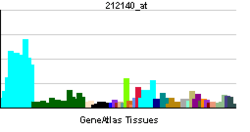PDS5A
Sister chromatid cohesion protein PDS5 homolog A is a protein that in humans is encoded by the PDS5A gene.[3][4][5]
References
Further reading
- Ishikawa K, Nagase T, Suyama M, et al. (1998). "Prediction of the coding sequences of unidentified human genes. X. The complete sequences of 100 new cDNA clones from brain which can code for large proteins in vitro". DNA Res. 5 (3): 169–76. doi:10.1093/dnares/5.3.169. PMID 9734811.
- Gregson HC, Schmiesing JA, Kim JS, et al. (2002). "A potential role for human cohesin in mitotic spindle aster assembly". J. Biol. Chem. 276 (50): 47575–82. doi:10.1074/jbc.M103364200. PMID 11590136.
- Strausberg RL, Feingold EA, Grouse LH, et al. (2003). "Generation and initial analysis of more than 15,000 full-length human and mouse cDNA sequences". Proc. Natl. Acad. Sci. U.S.A. 99 (26): 16899–903. doi:10.1073/pnas.242603899. PMC 139241
 . PMID 12477932.
. PMID 12477932.
- Ota T, Suzuki Y, Nishikawa T, et al. (2004). "Complete sequencing and characterization of 21,243 full-length human cDNAs". Nat. Genet. 36 (1): 40–5. doi:10.1038/ng1285. PMID 14702039.
- Kumar D, Sakabe I, Patel S, et al. (2004). "SCC-112, a novel cell cycle-regulated molecule, exhibits reduced expression in human renal carcinomas". Gene. 328: 187–96. doi:10.1016/j.gene.2003.12.013. PMID 15019998.
- Rankin S, Ayad NG, Kirschner MW (2005). "Sororin, a substrate of the anaphase-promoting complex, is required for sister chromatid cohesion in vertebrates". Mol. Cell. 18 (2): 185–200. doi:10.1016/j.molcel.2005.03.017. PMID 15837422.
- Ewing RM, Chu P, Elisma F, et al. (2007). "Large-scale mapping of human protein–protein interactions by mass spectrometry". Mol. Syst. Biol. 3 (1): 89. doi:10.1038/msb4100134. PMC 1847948
 . PMID 17353931.
. PMID 17353931.



 . PMID 11076961.
. PMID 11076961. . PMID 12477932.
. PMID 12477932. . PMID 17353931.
. PMID 17353931.